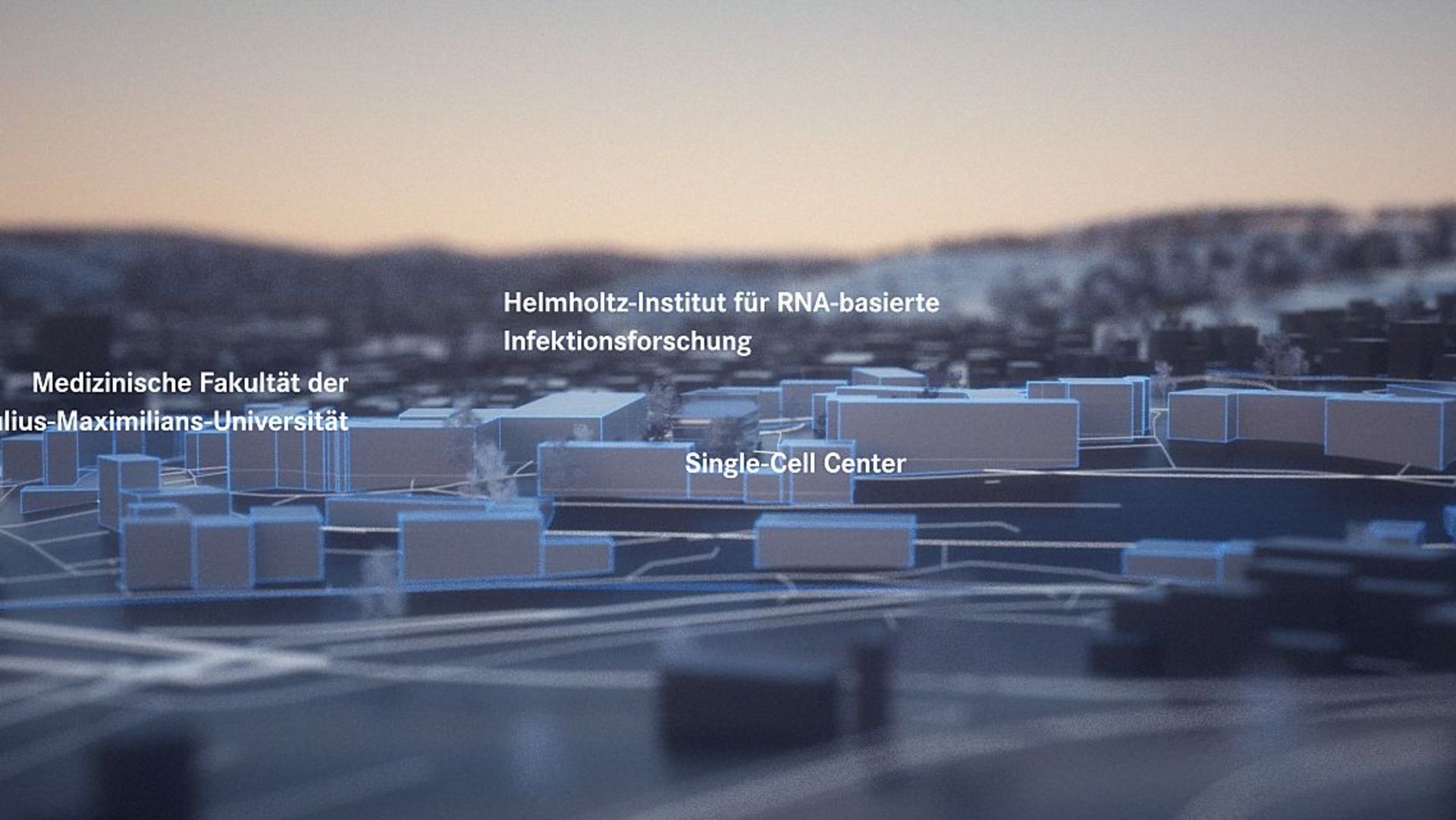
Partners and Funding
The Single-Cell Center Würzburg is a joint competence center of the Helmholtz Institute for RNA-based Infection Research (HIRI) with the Medical Faculty of the Julius-Maximilians-Universität Würzburg (JMU), the University Hospital Würzburg (UKW), the Max Planck Research Group in Systems Immunology (WüSI) and the Interdisciplinary Center for Clinical Research (IZKF).
The Single-Cell Center not only cooperates closely with scientific institutions in Würzburg, but is also linked to several research networks and projects and supports them with its state-of-the-art infrastructure and technology.
MICROSEQ: Center for Microbial Single-cell RNA-seq (DFG-funded)

MICROSEQ is a DFG-funded center dedicated to advance single-cell RNA sequencing in microbiology and infection research.
MICROSEQ will develop generic protocols for rapid, cost-effective and high-throughput bacterial scRNA-seq, provide state-of-the-art data analysis and visualization strategies, and offer training opportunities for microbiologists.
MICROSEQ is internationally unique in its focus and the collective expertise of the involved scientists, and thereby complements ongoing efforts by DFG to foster the application of NGS technology at German universities.
CRC DECIDE (DFG-funded)

The Collaborative Research Center (CRC) DECIDE focuses on redefining therapeutic strategies for infectious diseases by shifting from pathogen-targeted approaches to host-directed therapies.
The role of the Single-Cell Center Würzburg
A key component of DECIDE’s research approach is the integration of cutting-edge single-cell and spatial transcriptomics to dissect host-pathogen interactions at an unprecedented molecular resolution. The Single-Cell Center Würzburg plays a central role in this initiative by providing high-throughput single-cell RNA sequencing and high-resolution spatial transcriptomics, allowing for the comprehensive mapping of immune responses within infected tissues.
These technologies enable the detailed characterization of immune cell heterogeneity, the identification of molecular signatures associated with infection progression, and the spatial localization of pathogens within host tissues.
By combining highly multiplexed spatial transcriptomic platforms, such as Curio Seeker, Xenium, and Visium HD, with single-cell multi-omics approaches, researchers can analyze infection dynamics at both the cellular and tissue levels. This approach provides critical insights into the interactions between immune cells, epithelial barriers, and microbial communities, ultimately revealing new therapeutic targets for host-directed interventions. The ability to analyze infection processes with spatial and single-cell resolution is essential for understanding how immune responses vary across different tissue microenvironments. By leveraging these advanced technologies, DECIDE aims to bridge the gap between fundamental infection biology and clinical applications, paving the way for precision medicine approaches in infectious disease research.
CRC Cardioimmune Interfaces (DFG-funded)

The Collaborative Research Center (CRC) Cardioimmune Interfaces's research aims to uncover how immune responses shape myocardial infarction (MI) repair, adverse remodeling, and heart failure (HF) progression ischemic and non-ischemic contexts.
The role of the Single-Cell Center Würzburg
A key component of the CRC 1525 is spatial and single-cell transcriptomics, which provides high-resolution insights into immune cell behavior within the heart. The Single-Cell Center Würzburg plays a central role in profiling immune landscapes at single-cell resolution, deciphering cell-cell interactions, and identifying transcriptional programs that drive cardiac inflammation and remodeling.
The integration of spatial transcriptomics with established single-cell RNA sequencing (scRNA-seq) pipelines allows for the precise localization of immune cells in the myocardium, mapping their functional states in relation to tissue microenvironments. In collaboration with clinical and experimental cardiology teams, the center employs cutting-edge technologies such as high-resolution spatial transcriptomics (e.g., Curio Seeker, Xenium, Visium HD), single-cell sequencing (10x Genomics), and multi-omics approaches to analyze patient samples and preclinical models.
These approaches facilitate the identification of immune signatures predictive of disease progression and therapeutic responses. The Single-Cell Center Würzburg thus serves as a hub for integrating multi-omic technologies, advancing precision medicine in cardiovascular research, and fostering interdisciplinary collaborations between immunologists and cardiologists. Through these efforts, the CRC 1525 aims to translate fundamental discoveries into clinical applications, ultimately guiding the development of immune-targeted therapies and diagnostic tools for cardiovascular diseases.
BASE-LIPID
BASE-LIPID (BMWK-funded)
Since the COVID-19 pandemic, the benefits of mRNA for the production of vaccines have been undisputed. BASE-Lipid is a joint research project funded with nearly 13 million euros that aims to develop efficient and safe special lipids for mRNA-based drugs.
The role of the Single-Cell Center Würzburg
In the later stages of this project, the Single-cell Center Würzburg is central to the validation of different formulations through comprehensive cell culture and in vivo studies.
Our work includes investigating the biodistribution of particle formulations, assessing their targeting of specific organs and cell populations, and evaluating potential side effects.
A critical aspect of this endeavor is the necessity to adapt current or create innovative single-cell protocols to effectively visualize and analyze the LNPs within individual cells in both our in vitro and in vivo systems.
This rigorous validation process is crucial for strategically focusing and tailoring our particle design for its intended use.








